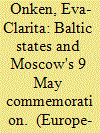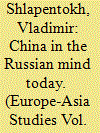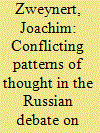| Srl | Item |
| 1 |
ID:
076726


|
|
|
|
|
| Publication |
2007.
|
| Summary/Abstract |
This article develops a three-level framework for analysing the role of memory in contemporary European politics. It tests the utility of this framework based on the three Baltic states and their public and political debates around the World War II anniversary commemorations in Moscow in 2005. Existing concepts for analysing the impact of memory on policy decisions are discussed first on the levels of domestic politics and bilateral relations. The article then provides a framework for researching a lesser acknowledged third level of memory politics within European institutions. The dilemma felt by the three Baltic presidents over whether or not to attend the Moscow ceremonies provides a unique opportunity to look at all three levels and demonstrate their relevance for understanding future memory struggles in an enlarged Europe.
|
|
|
|
|
|
|
|
|
|
|
|
|
|
|
|
| 2 |
ID:
076725


|
|
|
|
|
| Publication |
2007.
|
| Summary/Abstract |
This article describes the ambivalence of Russian attitudes toward China at the beginning of the twenty-first century. Russians of all strata combine a willingness to see China as a friendly neighbour with a high level of fear of the giant that could swallow much of the country whole, especially the Asian part. The article pays special attention to the split in Russian views of China among elites. While some elites, who have strong anti-American attitudes, see China as a major ally against the United States, others call on the government to treat the United States as the single force that can help Russia protect the integrity of its territory against China, whose people still do not recognise the existing borders between the two countries.
|
|
|
|
|
|
|
|
|
|
|
|
|
|
|
|
| 3 |
ID:
076727


|
|
|
|
|
| Publication |
2007.
|
| Summary/Abstract |
After a paradigm shift in Russian economics around 1990, in the period 1992 - 2002 Russian economists increasingly returned to the path-dependent shared mental models that had prevailed earlier in their country. In particular, after the liberal reform concept seemed to have failed to solve the socio-economic problems of transition, the old debate between 'Westernisers' and Slavophiles was forcefully revived. The conflict between these camps has not yet been settled. This makes it difficult to predict the further development of Russia's economic and political order.
|
|
|
|
|
|
|
|
|
|
|
|
|
|
|
|
| 4 |
ID:
076729


|
|
|
|
|
| Publication |
2007.
|
| Summary/Abstract |
This article explores the influence that state finance has had on the Romanian party system by examining the entry and exit of parties throughout the period of 1990 - 2004 and focusing on the number of parties that gained representation in the parliament as well as the party incumbency rate. I find that state finance has had a limited influence on the party system as a whole but has been influential for specific parties. I argue that the influence of state finance partly depends on when the system was introduced. In developing party systems, the influence of state finance on individual parties is more differential.
|
|
|
|
|
|
|
|
|
|
|
|
|
|
|
|
| 5 |
ID:
076728


|
|
|
|
|
| Publication |
2007.
|
| Summary/Abstract |
This article uses the Bulgarian case to analyse movement from a situation of what appeared to be a 'Partial-Reform Equilibrium' to an 'Equilibrium of Competitive Capture'. In such a process, elections are important forces for change, but not because they bring reformist parties to power or lead to completed economic liberalisation. Instead, especially in the first several electoral cycles in a new democracy, they can bring to power new leaders who are not beholden to existing captors, but rather to other clients that would like to capture the state for their own interests. Over time, the country experiences a parade of captors, eventually leading to a system where no single group owns the state, but where it is still not insulated. Instead, several competing groups fight with each other to raid it for their own benefits.
|
|
|
|
|
|
|
|
|
|
|
|
|
|
|
|
| 6 |
ID:
055171


|
|
|